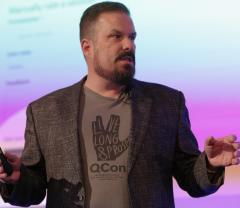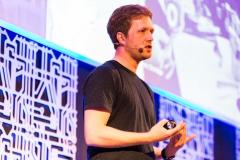Session + Live Q&A
Optimizing Your Web Performance: Separating the Signals from the Noise
Everyone agrees on the theory of optimizing web performance but how does it work in practice? In this talk I will be sharing the journey Trainline has been on leading up to Google introducing Core Web Vitals as a ranking signal this month. It will include how as a team we learned to separate out actionable insights from the reporting noise and how we built out our hypotheses to then have to tear them down. I’d like the audience to leave with clearer direction on how they can actually move the needle in web performance – and why it’s more important to measure this from the customer’s perspective and to learn how it impacts their experience.
Main Takeaways
1 Hear about Trainline’s journey to improve the performance of their web pages as we approach Google changing the ranking algorithm based on Core Web Vitals.
2 Learn how to improve the performance by setting up monitoring, analyzing the data and modifying the code.
Carl, what is the focus of your work these days?
I am the Director of Engineering for the front-end at Trainline. In essence, it means that I'm responsible for all externally facing teams, such as our iOS and Android applications, but also Web, landing pages, and also APIs serving customers.
What is the motivation for your talk?
The talk will be about optimizing Web performance, and I'll talk about the journey that we've been on over the last years. Optimizing web performance is actually much harder than it sounds. The complexity lies in the fact there isn’t a single metric to measure speed. The most common mistake is to focus on a specific metric as TTI or page load time, when in reality what you want to focus on is on the user experience.
What we found out on our journey is that whenever you focus on just the page load time, or the interactivity or maybe just the visual stability of your pages, it's always at the expense of another one. So the goal is really to measure all the things that make for a great page experience, keep the data and measure continuously, to learn what changes in your codebase will have an impact in production to your users, and then just refine and try to find the right balance.
It's always a fashionable topic, but even more right now because Google is actually changing the Google Search ranking algorithm to consider Core Web Vitals, making it more important than ever!
What would be the level and the persona of the attendees of your presentation?
I think anyone can come in. The idea is to start from what performance is, how do we measure it, and then just go step by step into the right methodology to improve it. I think it speaks to pretty much everyone. It's not linked to a specific technology. I mean, if you're React, ember.js, JQuery, vanilla JS, anyone can understand it. And we're really focusing on performance and how to optimize. It's not linked to any specific technology, so anyone interested in how to optimize web performance is welcome.
Would you be focusing more on what happens in the browser and how you can make the user experience faster? Will you be looking at delivery of the content, back-end stuff?
I don’t like those talks that give you those "one size fits all" solutions. It's more about giving you the methodology and the right monitoring so that I guarantee you that by applying these you’ll get there, you'll be able to spot those bottlenecks and you'll be able to know what your users experience from a speed perspective which is actually something that's very hard to do in a website. It's much easier in the back-end service because you can just monitor the time you spend in and out of the box. But in the browser, lots of things are happening, it's much more complex than monitoring the time that request took to complete: how do you measure how your user experiences your website? And how do you do it in a way that you can analyze so you can optimize, that’s what I’ll be focusing on in that talk.
Speaker

Carl Anderson
Director of Engineering @trainline
Carl Anderson is Director of Engineering at Trainline, managing the Front-End teams in developing Europe’s leading train and coach app. Having spent the last decade working as a developer, his career started in the Silicon Valley before moving on to various startups, including Deezer, where...
Read moreFind Carl Anderson at:
From the same track
BBC Online: Architecting for Scale with the Cloud and Serverless
Tuesday May 18 / 10:00AM EDT
During the 2020 US Presidential Election, BBC Online served video, audio, and text to over 140 million users. Events like this require the BBC’s sites and apps to be at their very best – fast, reliable, and relevant at massive scale. It’s been achieved with a modern,...

Matthew Clark
Head Of Architecture for the @BBC's Digital Products
Building and Scaling a Control Plane for 1000s of Kafka Clusters
Tuesday May 18 / 12:00PM EDT
At Confluent Cloud we deploy, manage, maintain and scale 1000s of Kafka, Kafka Connect and KSQL clusters. In order to create a cloud-native experience for our users, we've built a control plane that provides both self-serve functionality for our users and automation for Confluent engineers....

Gwen Shapira
Software Engineer @Confluent, PMC Member @Kafka, & Committer Apache Sqoop

Vivek Sharma
Senior Engineer @Confluent
Panel: Event Driven Architectures of Scale
Tuesday May 18 / 01:00PM EDT
Event-driven architectures (EDA) have been around for decades but are back in vogue, driven in part by the shift to the cloud and multicore architectures, data-driven applications, and related trends such as microservices and distributed computing. Our expert panel will explore what...

Wes Reisz
Technical Principal @thoughtworks & Creator/Co-host of #TheInfoQPodcast, previously Platform Architect @VMware

Matthew Clark
Head Of Architecture for the @BBC's Digital Products

Gwen Shapira
Software Engineer @Confluent, PMC Member @Kafka, & Committer Apache Sqoop

Ian Thomas
Senior Principal Engineer at Flutter Entertainment

